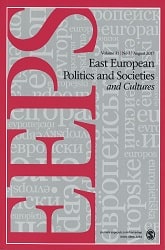What Is the German’s Fatherland? The GDR and the Resettlement of Ethnic Germans from Socialist Countries (1949–1989)
What Is the German’s Fatherland? The GDR and the Resettlement of Ethnic Germans from Socialist Countries (1949–1989)
Author(s): Jannis PanagiotidisSubject(s): Political history, Social history, Government/Political systems, Politics and society, Post-War period (1950 - 1989), Migration Studies, Sociology of Politics
Published by: SAGE Publications Ltd
Keywords: Migration History; GDR; COMECON; Ethnic Germans;
Summary/Abstract: This article deals with the migration of “ethnic Germans” from socialist Eastern Europe to the GDR in the decades after the Second World War. Post-expulsion resettlement from that region is commonly associated with Aussiedler migration to West Germany. Contesting the idea that East Germany displayed no interest in Eastern European Germans, this article shows that the GDR, which challenged the West German claim to be the sole representative of the German nation, also received ethnic German immigrants, mostly from Poland and the USSR. It argues that the distribution of roles between the two German states, with West Germany being the prime destination for resettlers, was not clear from the outset. It was only after Polish–West German “normalization” in 1970 that the FRG became the almost uncontested “fatherland” for Eastern European Germans. West and East German approaches resembled each other as long as they were predicated on humanitarian family reunification. They diverged as the GDR attempted co-ethnic labor recruitment in Poland in the 1960s. These efforts met with limited success, as East Germany was the weakest link in a cross-bloc “tetradic nexus” with the German minority in Poland, the Polish state, and West Germany. Meanwhile, the GDR authorities eyed grass-roots migration initiatives by Soviet Germans with suspicion, as they undermined the government aspiration to control the movement of people. The article finally argues that movement of labor had no priority in the project of socialist economic integration, which gives reason to suspect a link between limited migration and failed COMECON integration.
Journal: East European Politics and Societies
- Issue Year: 29/2015
- Issue No: 01
- Page Range: 120-146
- Page Count: 27
- Language: English
- Content File-PDF

